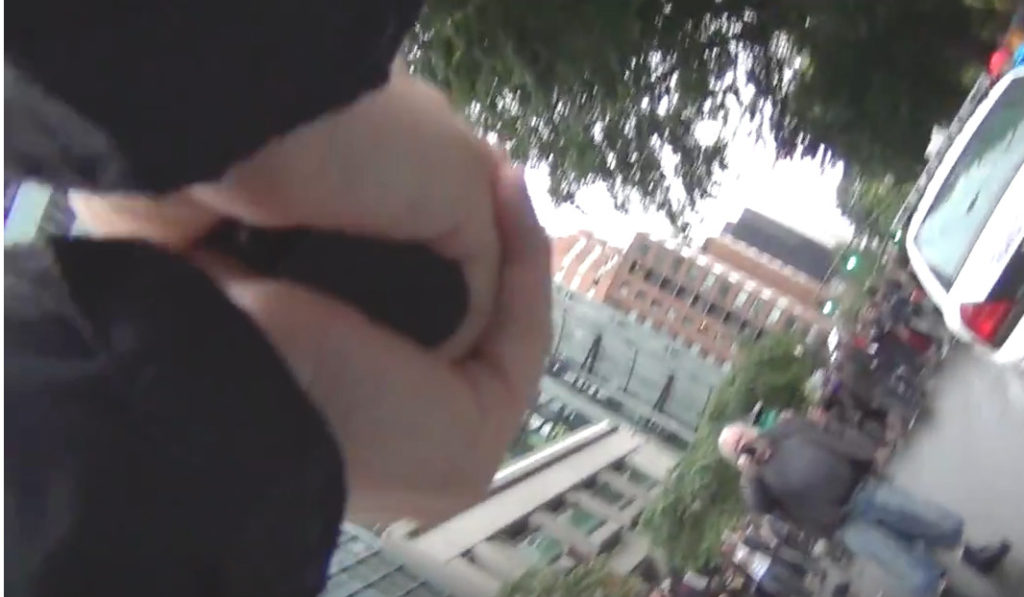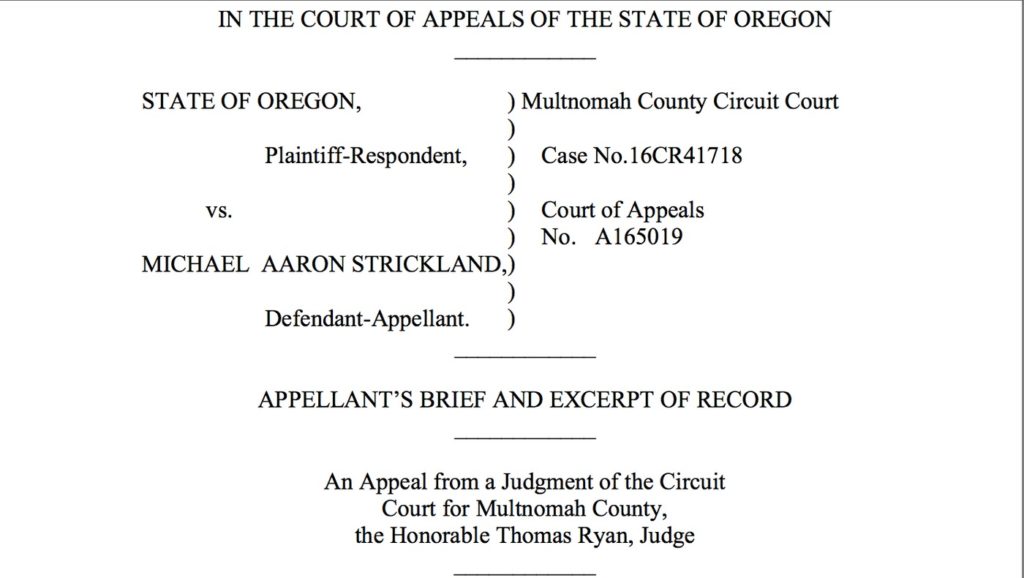Mike Strickland has called on the Oregon Appeals Court to set aside his conviction for unholstering pistol to defend himself after being attacked, menaced and chased by masked and armed Antifa protesters in July of 2016.
The incident happened at a “Don’t Shoot Portland”/”Black Lives Matter” event when a group of anarchist/masked Antifa broke off from the main protest group to stop Strickland from filming the event. Just moments before, some of the same people attacked Strickland with their Antifa flag poles and fists.
See most of my posts about this case here.
The main conspirator was a 300+ pound protester, Benjamin Kerensa, who roughed up Strickland and chased him down the street.
Kerensa was depicted as a “victim” in this case, but was, in fact, an instigator of the violence against Strickland. Kerensa is a multiple felon and has served time in both state and federal prison.
Kerensa holds himself out to be some kind of software designer, but is, in reality, a hacker, and continues to hassle people who photograph Antifa protests.
He is a dangerous man.
Benjamin Kerensa Attacks Michael Strickland
Violent Ben Kerensa, known domestic terrorist and federal felon, attacks me last July 7th, 2016. You can see him leading a group of mask-clad anarchists, 3 o…
Strickland feared for his life with the 300 pound Kerensa bearing down on him and others rushing the videographer.

Strickland is a working journalist who covered these events for his own news site on YouTube as well as for other national news sites.
Strickland was found guilty of ten counts of unlawful use of a weapon, ten counts of menacing, and one count of disorderly conduct in the second degree. He could have gone to prison for decades for the offenses. At sentencing, he was ordered to serve 40 days in jail.
The appeal was filed by Robert Barnes of Los Angeles and Mark Geiger of Salem.

In the discussion of the case, Barnes said that Strickland’s case was a study in ambush:
“Attack by ambush followed by trial by ambush followed by verdict by ambush.”
Among the issues that the attorneys claimed were wrongly decided were:
The trial court committed reversible error when it denied Defendant’s motion for a change of venue.
Local media about the case described Strickland in prejudicial terms which would have tainted a jury pool:
Within the articles, misinformation concerning Defendant was widespread and included falsely alleging Defendant was a “white nationalist anarchist”; falsely stating that Defendant was at the protest to instigate others; falsely describing Defendant as a “counter protestor”, “right-wing troll”, and “crazy guy”; and falsely claiming Defendant came to the protest “prepared for battle” and “nearly shot [the protestors].”
Barnes argues that the local prosecutor and police chief clearly tried to prejudice media coverage against Strickland:
At arraignment, State Attorney Katharine Molina told the press that Defendant had a past police report involving a situation wherein an attendee of a vigil for the Orlando nightclub shooting was sent harassing text messages of a race based nature after asking Defendant to leave the vigil. (ER 45) The State pushed this story to the press despite there being no proof that Defendant had anything to do with it. (ER 45) The State essentially accused Defendant of being a racist to the press, in a time where racial issues are at the forefront of American politics, despite no proof existing for the claim. (ER 45) Also, Portland Chief of Police Mike Marshman, in a memo sent to the Portland Police Bureau that was later spread by the press, described Defendant as someone who “menaced other protestors” and claimed that as a result the protest “could have turned deadly.” (ER 135.)
Those statements were not only unfair, they were untrue.
Barnes further argued that the unprovoked beating by an anti gun filmmaker, which severely broke Strickland’s arm, requiring surgery, should have been allowed into evidence to help establish his state of mind at the time of the attack at the Don’t Shoot Portland event.
The trial court committed reversible error when it granted the State’s motion to exclude evidence of an unrelated prior altercation.
A surprise use-of-force witness brought in at the 11th hour, giving defense attorneys only a few hours’ notice was prejudicial and reversible error by Judge Thomas Ryan:
The trial court committed reversible error when it allowed the prosecution to put forward a surprise rebuttal witness because the State had not properly notified the defense of said witness.
The defense attorney took issue with the way in which the ‘victims’ were labeled by local prosecutors, giving Strickland no way to object:
It also offered vague descriptions of the alleged victims, rather than naming them. The court denied the demurrer, holding that the prosecution can charge in the alternative. The trial court committed reversible error when it denied Defendant’s demurrer, although the indictment charged more than one defense not separately stated and it was not definite or certain.
Strickland’s appeals attorney took issue with the Judge’s order not allowing him to use a camera, video equipment – in other words, the tools of his trade – while under parole and probation:
In addition to the myriad of prejudicial decisions against Defendant, the trial court committed an error when it violated Defendant’s constitutional rights guaranteed by the first amendment.
The 456 page document, complete with multiple pages of exhibits and testimony, was filed in court on December 12th.



